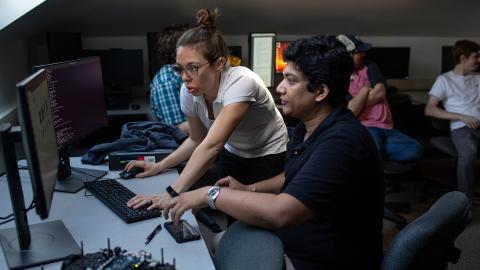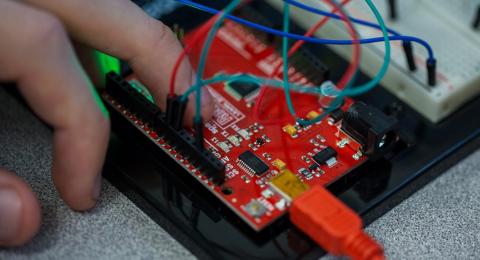You’ve always wanted to be on the cutting edge.
With a degree from Plymouth State University, you will have the knowledge, critical thinking and communication skills, and experience you need to solve real-world problems in the fields of computer science and information technology. Our department emphasizes a hands-on approach to learning built on top of extensive laboratory experience, individual interactions and support, and significant group projects.
This program focuses on the design and development of software systems with an emphasis on the creation of new technology. Students will build a framework of conceptual knowledge and practical skills through core computer science courses. A broad selection of electives offers the opportunity to delve into several of the application areas of Computer Science. Auxiliary courses in mathematics and science develop additional analytical skills necessary for success in the many computing specialties that graduates typically choose.
Curriculum & Requirements
| Course | Title | Credits |
|---|---|---|
| Major Requirements | ||
| CS 2010 | Computing Fundamentals (TECO) | 3 |
| CS 2220 | Computer Hardware | 3 |
| CS 2370 | Introduction to Programming | 4 |
| CS 2381 | Data Structures and Intermediate Programming | 4 |
| CS 2470 | Systems Programming in C/C++ | 2 |
| CS 3221 | Algorithm Analysis | 4 |
| CS 3600 | Database Management Systems & Security | 4 |
| CS 3720 | Systems Analysis and Design | 3 |
| CS 3780 | Introduction to Computational Theory | 3 |
| CS 4140 | Software Engineering | 3 |
| CS 4250 | Computer Architecture | 3 |
| CS 4310 | Operating Systems | 3 |
| CS 4520 | CyberEthics (DICO,WRCO) | 3 |
| CS 4760 | Senior Project | 3 |
| MA 2300 | Statistics I (QRCO) | 3 |
| MA 2450 | Mathematical Reasoning | 4 |
| Science course with laboratory (not BIDI/CHDI/ESDI/MTDI/PHDI) | 4 | |
| Major Electives | ||
| Complete two courses from the following: | 6-7 | |
CS 2900 | Digital and Analog Circuits | |
CS 2901 | Materials, Design and Fabrication | |
CS 2905 | PLC Programming | |
CS 3015 | Mobile Application Development | |
CS 3020 | Web Programming | |
CS 3030 | ||
CS 3240 | Data Communication and Computer Networks | |
CS 3420 | Introduction to Cybersecurity | |
CS 3500 | Introduction to Artificial Intelligence | |
CS 3650 | Big Data Administration and Analysis | |
CS 3820 | Human-Computer Interaction | |
CS 4230 | System Administration | |
CS 4400 | Computer Networks and Protocols | |
CS 4420 | Computer Security | |
CS 4920 | Computer Science Internship (maximum of three credits) | |
| Calculus | ||
| MA 2550 & MA 2560 | Calculus I (QRCO) and Calculus II (QRCO) | 8 |
| General Education | ||
| EN 1400 | Composition | 4 |
| IS 1115 | Tackling a Wicked Problem | 4 |
| CTDI | Creative Thought Direction | 3-4 |
| PPDI | Past and Present Direction | 3-4 |
| SIDI | Scientific Inquiry Direction | 3-4 |
| SSDI | Self and Society Direction | 3-4 |
| Directions (choose from CTDI, PPDI, SIDI, SSDI) 1 | 4-8 | |
| GACO | Global Awareness Connection | 3-4 |
| WECO | Wellness Connection | 3-4 |
| Electives | 15-18 | |
| Total Credits | 120 | |
- 1
Directions should total 20 credits (unless the major has a waiver for a specific Direction).
Check all course descriptions for prerequisites before planning course schedule. Course sequence is suggested but not required.
To complete the bachelor’s degree in 4 years, you must successfully complete a minimum of 15 credits each semester or have a plan to make up credits over the course of the 4 years. For example, if you take 14 credits one semester, you need to take 16 credits in another semester. Credits completed must count toward your program requirements (major, option, minor, certificate, general education or free electives).
| Year One | Credits | |
|---|---|---|
| EN 1400 | Composition | 4 |
| IS 1115 | Tackling a Wicked Problem | 4 |
| CS 2010 | Computing Fundamentals (TECO) | 3 |
| CS 2370 | Introduction to Programming | 4 |
| Complete two-semester Calculus Sequence: | ||
| MA 2550 & MA 2560 |
Calculus I (QRCO) and Calculus II (QRCO) |
8 |
| CTDI | Creative Thought Direction | 3-4 |
| PPDI | Past and Present Direction | 3-4 |
| Elective | 0-2 | |
| Credits | 29-33 | |
| Year Two | ||
| CS 2220 | Computer Hardware | 3 |
| CS 2381 | Data Structures and Intermediate Programming | 4 |
| CS 2470 | Systems Programming in C/C++ | 2 |
| CS 3221 | Algorithm Analysis | 4 |
| CS 3600 | Database Management Systems & Security | 4 |
| MA 2450 | Mathematical Reasoning | 4 |
| MA 2300 | Statistics I (QRCO) | 3 |
| SIDI | Scientific Inquiry Direction | 3-4 |
| SSDI | Self and Society Direction | 3-4 |
| Credits | 30-32 | |
| Year Three | ||
| CS 3720 | Systems Analysis and Design | 3 |
| CS 3780 | Introduction to Computational Theory | 3 |
| Science course with laboratory (not BIDI/CHDI/ESDI/MTDI/PHDI) | 4 | |
| Directions (choose from CTDI, PPDI, SIDI, SSDI) 1 | 4-8 | |
| GACO | Global Awareness Connection | 3-4 |
| WECO | Wellness Connection | 3-4 |
| Electives | 6-8 | |
| Credits | 26-34 | |
| Year Four | ||
| CS 4140 | Software Engineering | 3 |
| CS 4250 | Computer Architecture | 3 |
| CS 4310 | Operating Systems | 3 |
| CS 4520 | CyberEthics (DICO,WRCO) | 3 |
| CS 4760 | Senior Project | 3 |
| Complete two Major Electives from the following: | 6-7 | |
CS 3015 |
Mobile Application Development | |
CS 3020 |
Web Programming | |
CS 3240 |
Data Communication and Computer Networks | |
CS 3420 |
Introduction to Cybersecurity | |
CS 3500 |
Introduction to Artificial Intelligence | |
CS 3820 |
Human-Computer Interaction | |
CS 4230 |
System Administration | |
CS 4400 |
Computer Networks and Protocols | |
CS 4420 |
Computer Security | |
CS 4920 |
Computer Science Internship | |
| Electives | 7-10 | |
| Credits | 28-32 | |
| Total Credits | 120 | |
- 1
Directions should total 20 credits (unless the major has a waiver for a specific Direction).
- The ability to develop applications to solve small and large problems, both independently and as part of a team.
- An understanding of how the running time of algorithms is measured and the theoretical limitations of computing.
- An understanding of computer instruction-set architecture and experience with hardware-focused programming.
- The ability to communicate technical information to a wide range of audiences.
- An understanding of professional, ethical, and security issues and responsibilities that arise with modern socio-technical systems.
- Computer Programmer
- Computer Systems Manager
- Control Engineer
- Database Administrator
- Manager, Management Information Systems
- Network Administrator
- Quality Assurance Specialist
- Robot Software Engineer
- Robot System Engineer
- Software Designer
- Software Developer
- Software Engineer
- System Analyst
- Web Application Developer
- Technical Writer
- Web Designer
- Ability to analyze cause and effects
- Ability to think logically and critically
- Strong communication skills
- • Mathematical background
Explore Program Details

As a Computer Science and Technology student you will be part of a tight-knit community. We spend a lot of time working in teams on projects, playing games over lunch with professors, and asking questions during open tutoring hours. These connections not only keep the department lively, but also build a network that can provide career opportunities.
- Evening tutoring hours
- Internship and career opportunities
- Board game groups
- Meet and talk with alumni in the field
- Senior Project presentations
More to Explore
Explore Today.
Realize Tomorrow.




